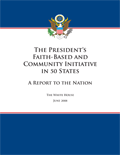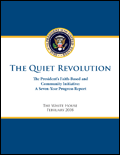- Acting Director Jedd Medefind
- Background & Overview
- Grant Opportunities
- Guidance Materials
- Technical Assistance
- Data Collection
- Reports
- Press Room
- Join Our Mailing List
- Contact Us
- State Liaisons
|
Home >
Government
|

Fact Sheet: Faith-Based And Community Initiatives: Delivering Help And Hope To Millions At Home And Around The World
President Bush Discusses The Important Role Of His Faith-Based And Community Initiatives In Transforming the Way Our Nation Addresses Human Need
On June 26, President Bush addressed the White House Office of Faith-Based and Community Initiatives (OFBCI) "Innovations in Effective Compassion" National Conference. President Bush used his first executive order as President to establish the Office of Faith Based and Community Initiatives at the White House, and his next one created Faith-Based and Community offices within major Federal agencies. These offices were tasked with a bold mission: to lower the legal and institutional barriers that prevented government and faith-based groups from working as partners and to ensure that the armies of compassion played a central role in the campaign to make America more promising and more just.
In Partnership With America's Armies of Compassion, The Faith-Based And Community Initiative Has Waged A Determined Attack On Need
The Faith-Based and Community Initiative has helped level the playing field for faith-based groups and other charities – especially small organizations that had struggled to compete for funds in the past. Federal agencies have issued 15 regulations mandating that faith-based organizations be treated the same as secular groups and has applied these regulations across the Federal Government. It has educated religious groups – as well as thousands of Federal employees – to ensure these rules are fully applied.
President Bush and his Administration have advanced policies that yield greater support for faith-based and community groups. Working with Congress, the Administration has:
- Trained more than 100,000 social entrepreneurs to build their capacity and more effectively engage need.
- Amended the tax code to provide greater incentives for charitable giving and activities.
- Established the Compassion Capital Fund to help grassroots nonprofits that serve the needy to increase their effectiveness and reach.
- Launched the Pro Bono Challenge, a three-year campaign to encourage corporate professionals like accountants and lawyers to share their time and expertise with the nonprofit sector.
The Faith-Based And Community Initiative Is Helping To Revolutionize The Way Our Government Addresses The Greatest Challenges Facing Our Society
The Initiative has moved government away from large, bureaucratic programs toward responses led by social entrepreneurs that harness the passion and personal touch of neighbors serving neighbors. For example:
- Addiction Recovery: To date, the Access to Recovery (ATR) program has provided approximately 200,000 recovering addicts with vouchers that allow them to choose among a range of clinical and supportive services, including those offered by faith-based providers. As a result, thousands of faith-based and community organizations (FBCOs) are serving recovering addicts through ATR, many of them partnering with government for the first time.
- Prisoner Re-entry: The President's Prisoner Re-entry Initiative links returning nonviolent offenders with FBCOs that help them find work and avoid relapse into criminal activity. Only 15 percent of these former offenders have been re-arrested again within one year, a rate far less than half the national average.
- At-Risk Youth: Through the Mentoring Children of Prisoners program, the Administration has joined with faith-based and community groups to match nearly 90,000 children of prisoners with adults who offer love, guidance, and a positive example.
- Community Health Services: The President's Health Center Initiative has exceeded its goal of creating new or expanding 1,200 community-based health center sites. The Initiative has boosted the number of low-income individuals receiving medical services from local clinics by 4.7 million since 2001.
- Homelessness: The Department of Housing and Urban Development has greatly expanded partnerships with faith-based and community groups to help find homeless Americans safe places to stay. These efforts have contributed to a nearly 12 percent reduction in the number of chronically homeless Americans – meaning more than 20,000 individuals have moved from the streets or shelters to a new residence.
- Global Health: International programs like the President's Emergency Plan for AIDS Relief (PEPFAR) and the President's Malaria Initiative (PMI) represent massive-scale implementations of the President's vision to empower American and indigenous FBCOs. In 2007 alone, more than 2,200, or 87 percent, of PEPFAR partners were indigenous organizations, and nearly one-quarter of all partners were faith-based. The latest PEPFAR results show that we now support treatment for more than 1.7 million people. Additionally, in just over two years, PMI has helped reached more than 25 million Africans with lifesaving prevention and treatment services.
- Disadvantaged Students: The latest data show that more than 515,000 children received after-school tutoring through Supplemental Educational Service providers, many of which are faith-based and community organizations.
- Disasters: In 2006, the Administration created a Center for Faith-Based and Community Initiatives at the U.S. Department of Homeland Security to more fully integrate FBCOs into preparedness and response at every level of government. The National Response Framework was also revised in 2006 to provide a more central role to nonprofit organizations. Since Hurricane Katrina, over 93,000 participants in National Service programs have given more than 3.5 million hours of service and managed 262,000 volunteers in response and recovery efforts.
- Economic Development: Since 2002, the Department of Commerce's Economic Development Administration (EDA) has increased the number of its partnerships with FBCOs by 70 percent. Since 2001, EDA has invested over $175 million in236 projects led by faith-based or other community nonprofits, which were anticipated to create more than 88,000 jobs and $3.8 billion in private investment.
- Hunger: The United States is the world's largest provider of food aid, helping to feed more than 35 million hungry individuals in FY 2007. Faith-based and community organizations are vital allies in effective delivery of domestic nutrition assistance, which has increased by more than 75 percent (to $59 billion) since 2001. USDA also works with a variety of faith-based and community groups to provide food aid around the world.
- Veterans: From 2002 to 2007, the number of FBCOs funded through the VA's Grants and Per Diem Program to serve homeless veterans rose from 176 to 506, a 287 percent increase. Additionally, over 80 percent of homeless veterans in residential programs with VA services were appropriately housed one year after their discharge from the program. As of last year, VA estimates that the number of homeless veterans was nearly cut in half over just five years.
The Faith-Based And Community Initiative Has Built A Powerful Grassroots Network
- Federal competitive awards are expanding the good work of both faith-based and community organizations across America and beyond.
- Last year alone, the Federal Government provided more than 19,000 direct, competitive awards to America's nonprofit organizations to aid the homeless, at-risk youth, recovering addicts, returning offenders, people infected of affected by HIV/AIDS, and others.
- These grants totaled more than $15.3 billion and all served to boost services to people in need. Faith-based organizations were welcomed as a central part of this work, winning more than 3,200 grants in 2007 totaling over $2.2 billion.
Today 35 governors – 19 Democrats and 16 Republicans – have their own faith-based and community initiatives. Additionally, more than 70 mayors of both parties have similar programs at the municipal level.
- Americans have volunteered in record numbers. Of the 60 million people who give their time to others, more than one-third do so through faith-based groups.
- Charitable giving is now at an all-time high. In 2007, donations to America's charities topped $300 billion for the first time.
# # #


 Jay Hein
Jay Hein

